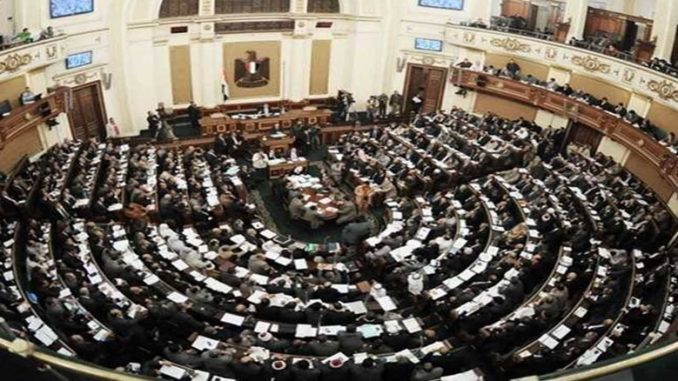
A coalition of Egyptian parliamentarians will submit a request for constitutional amendments providing for a second chamber of parliament and the appointment of one or more deputy presidents, state news agency MENA reported on Saturday.
The move follows a separate attempt by a group of ordinary Egyptians to change presidential term limits in the constitution, which was adopted in 2014 after the military overthrew Egypt’s first democratically elected President Mohamed Morsi.
His government has been widely criticized by rights groups over the repression of dissidents.
Egypt is slowly recovering from a deep economic crisis that has seen the value of its currency plummet and state subsidies slashed.
Speculation has been rife that the authorities will seek changes to the constitution, which limits a president to two four-year terms in office, since Abdel Fattah al-Sisi’s re-election in March in a vote against a marginal opponent.
The lawmakers’ proposed amendments will be presented to parliament speaker Ali Abdelaal today Sunday. Any changes need approval by two-thirds of parliament members, followed by a referendum.
MENA said the lawmakers’ proposed changes include restoring the Shura Council, an upper chamber that operated alongside the current 596-member House of Representatives, previously known as the People’s Assembly, until it was canceled in 2014; and the appointment of one deputy or more for the president.
The proposed amendments also include a quota guaranteeing women at least 25 percent of parliament seats, as well as “adequate representation” for youth, farmers, workers and the country’s Christian minority.
There was no word on any proposed changes to the limit on presidential terms, but the head of the “Support Egypt” coalition, which is spearheading the amendments, Abdel-Hadi al-Qassabi, said that parliament members were entitled to present a request to amend any article in the constitution.
Qassabi said that Article 226 of the constitution allows the president and a fifth of parliament members to propose an amendment to any article of the constitution.
MENA said in December that an Egyptian court had scheduled hearings on a petition by a number of Egyptian citizens demanding that the parliament speaker take steps to introduce constitutional changes that would allow Sisi to seek re-election after his second term in office expires.
The petitioners argue that Article 140 of the constitution, which sets the term limits, is “unfair to the great Egyptian people” and that eight years gives a president little time to deal with the economic and security challenges facing the country.
It is worth to mention that in November 2017, even before he was re-elected, al-Sisi told American news network CNBC he would not seek a third term in office.
But after his slide victory in the March 2018 polls, the question has gradually returned to public debate.
The presidential election featured only one other candidate – himself an ardent Sisi supporter – after all serious opposition contenders halted their campaigns in January 2018.
The main challenger was arrested and his campaign manager beaten up, while other presidential hopefuls pulled out, citing intimidation.
Mohammad Fuad, and MP with the Wafd party close to the government, said that “the whole of Egypt was talking about (Rizk’s) article last night”.
“This issue has been under discussion everywhere in Egypt, not just in parliament, for some time,” he said, adding that a potential parliamentary debate on the issue had not been initiated by the government.
In the current context of Egyptian politics, there was little surprise that the debate was taking place, Fuad said.
“People have been expecting a constitutional amendment on extending presidential terms, because every time the debate turns to the end of (Sisi’s) second term, the question is: who is the alternative? That causes panic,” he said.
Mustafa Kamal al-Sayed, a political science professor at Cairo University, said Rizk “did not express a personal point of view, but revealed trends within government institutions”.
He said Sisi “does not want to step down from power while he is alive… he fears that he could be held to account if he leaves his post”.
HA Hellyer, a senior fellow at the Atlantic Council and the Royal United Services Institute in London, said that “every indication from the last few years indicates that amending the constitution is of foremost importance”.
“Otherwise we would not have seen all these trial balloons in the media, and we would have seen indications of successors that are being groomed,” he said.



